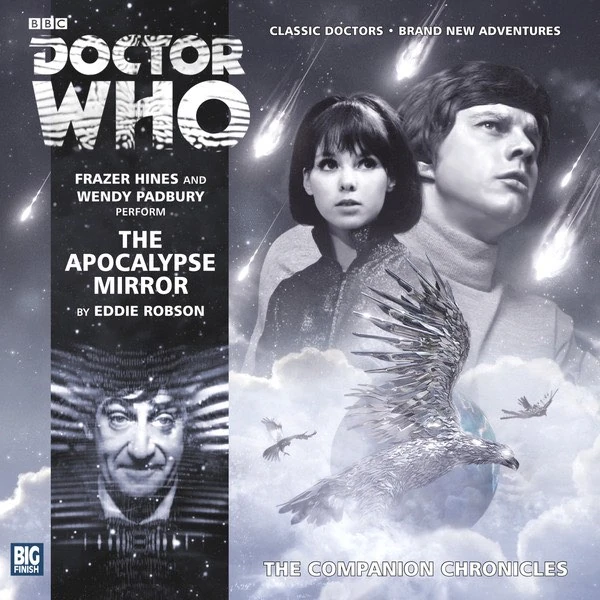The Companion Chronicles
The Apocalypse Mirror

|
|
Big Finish Productions The Companion Chronicles The Apocalypse Mirror |

|
| Written by | Eddie Robson |  |
| Format | Compact Disc | |
| Released | 2013 |
| Starring Frazer Hines and Wendy Padbury |
| Synopsis: The TARDIS lands in the city of Tromesis on Earth --- but it's a world far from the one that the Doctor, Jamie and Zoe recognise. The buildings are ruined, the streets deserted. And against the devastation they see a ghostly mirror image of another place --- the city as it was before disaster hit. People vanish here, and huge metal birds attack from the sky. Can the Doctor find the future, in a place that doesn't have one? |
Jamie in the City of Tomorrow by Matthew Kresal 15/2/25
One of the joys of Big Finish's range of Companion Chronicles range was its showcasing performers from the series' early years, particularly in a time before recastings of actors no long with us became more common. Fan favorites given a new spotlight, such as William Russell's Ian and Louise Jameson's Leela, or underused companions given a chance to shine, including Jean Marsh's Sara Kingdom and Caroline John as Liz Shaw. Then there's Frazer Hines, well-remembered as Jamie McCrimmon, Scottish companion to Patrick Troughton's Doctor, who garnered much praise for his work on the range. Something that the likes of The Apocalypse Mirror helps to highlight.
Something owed, it must be said, to the simple fact that this is a Jamie focused story. To the extent that, while Wendy Padbury as Zoe appears as the second voice in the production, the script never shifts to Zoe's point of view. Instead, it remains firmly focused on Jamie, which rather leaves Zoe playing second fiddle despite Big Finish having Padbury in the studio reprising her role. A shame to some extent, given the chemistry between Hines and Padbury that's persisted from the late 1960s to the present day, but a paradoxical bonus.
Because the focus on Jamie means that Hines as a performer is on his toes. This late in the range's run, Hines has shown enough skills that those making them could entrust him with an ambitious script. Ambitious, at least, in how much material it gave him to play not only as Jamie but as the Doctor and reading in other characters. Eddie Robson's script and Lisa Bowerman's direction gets a fair amount of mileage out of that, rightly so. Hines's Jamie sounds as though he could have walked off the studio floor in his sixties heyday, capturing the youthful energy and the banter between not only himself and Padbury but also with Troughton as the Doctor. No small feat, given that Hines is also voicing the Doctor! Impeccably so, living up to the reputation of Hines being able to uncannily recreate the dulcet tones that Troughton would often employ. Given the large "cast" of supporting characters handed to Hines, it's also to his credit that he keeps them recognizably different from one another, even when they only have a handful of lines on offer.
Which, strong as Hines is in this, does give the impression of having left Padbury as Zoe out to dry. It's hard to rate Padbury here as a result, given that Zoe vanishes from the middle of the narrative. True, Robson's script wonderfully recreates the banter between them, with the added bonus that this TARDIS trio feels entirely authentic. But it means Zoe essentially appears to handle exposition that Jamie as a character would otherwise struggle with.
Given Robson's script, there's a sense that this is a story that is being told from the wrong companion. Set in a crumbling city of the future with a repressive society and facing disaster, Robson's script feels like an odd choice for a Jamie-told story. The setting feels more in keeping with Zoe, whose reaction to this version of her future is palpable for the brief moment Robson takes to explore it. Jamie can offer an outsider's perspective to the future, but unlike The Jigsaw War where Jamie's disorientation becomes part of the plot or a story like The Glorious Revolution that drops him into a time close to his own, the choice of him for point of view means the story doesn't quite deliver on its promise.
Because The Apocalypse Mirror has some intriguing themes lurking within it: a city that crumbles while its people disappear, where thinking that things used to be better is a crime, but no one seems keen on fixing the present. There's also some wonderful imagery, including the mechanical bird-like Hawkers who serve as the obligatory Doctor Who monster of the tale. What lies behind it all is a neat twist with a message about the need to believe in a better future to make it possible feeling more timely a decade on from when this was first released. Crammed into a single disc's running time, the story doesn't outstay its welcome by any means. Nor is it as fleshed out as it could have been, as the twist, despite being clever, comes across as slightly left field. Mind you, the Doctor's final lines would likely be the source of controversy if they were written for a TV story these days.
While it might not be to the likes of The Glorious Revolution or The Jigsaw War, The Apocalypse Mirror still contains plenty to recommend it for. Though the runtime doesn't quite offer enough room for its final twist to breathe, the ideas in Eddie Robson's script remain compelling and even prescient more than a decade later. Nor can there be any doubting Frazer Hines as a reader on the basis of his work here. If there's a reason to seek out this Companion Chronicles tale, it's for just how good Hines is.
Which makes one wish the story itself was a wee bit stronger.